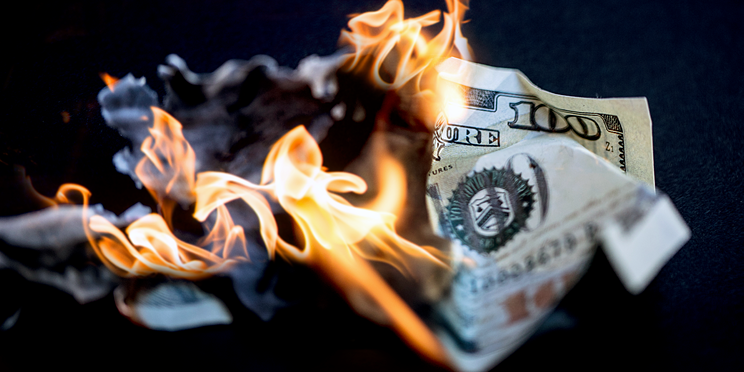For startups and growing companies, burn rate can make the difference between thriving for years or closing up shop. It’s a critical metric for any investor who may be thinking of supporting your business. It’s also frequently misunderstood and underestimated by those who should pay attention to it most.
Here’s what you need to know about burn rates, including what they are and why they matter — and how to calculate yours and determine if it’s where it should be.
What Is a Burn Rate?
So, what is a burn rate? The burn rate, also known as “cash burn rate,” is the rate at which a company spends money, usually calculated as a monthly average. For example, if a company spends an average of $12,000 a month, the company’s burn would be $12,000.
It’s also a key indicator of a company’s overall financial health. If you know how much you’re spending each month and how much cash you have on hand, you can make better financial decisions and communicate more effectively with investors.
What Is a Burn Rate Strategy?
Your burn strategy directly influences how you run your company. When you closely monitor and use the metric to make operational decisions, you are employing a burn rate strategy. A good strategy will help you determine the following:
- The size and scope of your budget
- Expense planning
- Opportunities to save money
- How much time a new round of funding will buy your company
- Whether to prioritize fundraising now or later
Above all, knowing your burn rate is essential in determining your cash runway.
What Is a Cash Runway?
“Cash runway” refers to how much time a company has before it runs out of money. It is a projection based on an organization’s cash stores and average monthly burn rate. Calculating your cash runway is an important next step.

How to Calculate the Burn Rate
The formula is a simple average of a company’s monthly spend.
To calculate your average monthly burn rate in a year, subtract your current cash from your starting cash, then divide by 12.
For instance, if your company had $500,000 on January 1st and $200,000 on December 31st, your burn rate is $25,000:
($500,000 – $200,000) ÷ 12 months = $25,000
Note that you can calculate with or without income factored into the equation. A “with income” calculation can help you understand the long-term viability of your company’s spending habits. “Without income” is a worst-case scenario calculation that indicates how long your company would survive if all your income streams were suddenly cut off.
Calculating Cash Runway
To determine your company’s cash runway, divide your cash on hand by your burn rate. Using our example above, that would mean a company with $200,000 in the bank and a burn of $25,000 has a cash runway of eight months:
$200,000 ÷ 25,000 = 8 months
Note that a cash runway calculation assumes the company won’t raise additional money and won’t experience a drastic change in its financial situation. This is what makes cash runway a fundamental benchmark. The “bare minimum” projection indicates how long the company could survive without generating any income.
What Is the Right Burn Rate for Your Company?
Regardless of its situation, any company should have a burn rate that ensures at least six months of cash runway. Any less than that, and you may not be ready for unexpected changes in revenue or spending (that’s why it’s so important to learn how to calculate it).
In other words, your monthly spending should never dip into the bare minimum of capital you need to keep your business running for the next six months.
Of course, every company is different. A financial strategy that works for one startup may be a major misstep for another. Consider framing your burn rate in terms of growth and deepening your awareness by drilling down into specific metrics such as “burn per new hire” or “burn per department.”
If you’ve got the means to embark on a period of growth, then crank up your burn rate for a while and spend some money on growing your business. The “means” in this case are tangible resources such as an influx of new customers or increased sales of a specific product or service.
In the absence of substantial cash on hand or the prospects of it arriving soon, an alternate source can provide a company the means to accelerate its burn rate. This could be a strong line of credit or support from venture capital. However, relying on credit or investors to spend more requires a company to adequately forecast for repayment down the road. The business must ensure that adequate revenue is coming to support both the cash burn rate and credit obligations.
Always Consider Your Means
Learning the formula helps you consider what your company has the means to do. If you find that your company really doesn’t have the tangible means to accelerate its burn rate, reconsider your growth plan and maintain a more conservative spend — regardless of your company’s potential or the level of risk you’re willing to accept.
Intangibles are another thing altogether. They may be appealing to investors, but think twice before you allow them to influence your calculation. Intangibles like team skill and expertise, and workforce productivity, are certainly important, but they don’t have a direct relationship with the amount of cash a company has on hand.
Similarly, anticipated growth of a particular market or industry and a strong brand awareness are intangible assets. The same can be said for trade secrets, third-party valuations, and excellent client relationships. As you learn how to calculate the burn rate, don’t fool yourself into thinking that intangibles can be counted on to help grow your company.
Need to revamp your cash flow strategy? Indinero can help.
Your company’s survival closely correlates to your burn rate and cash runway. When you run a growing company, the money you have ultimately matters more than any money you’ll potentially make. That’s why it pays to learn the burn rate formula.
Want to start spending smarter today? Indinero has the answers. Talk to us now to see how we can help.




